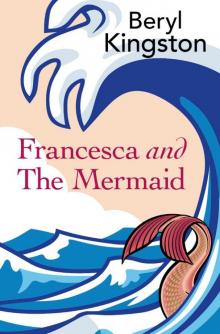- Home
- Beryl Kingston
Tuppenny Times
Tuppenny Times Read online
Tuppenny Times
Beryl Kingston
To Larry
Contents
The Easter Family Tree
Chapter One
Chapter Two
Chapter Three
Chapter Four
Chapter Five
Chapter Six
Chapter Seven
Chapter Eight
Chapter Nine
Chapter Ten
Chapter Eleven
Chapter Twelve
Chapter Thirteen
Chapter Fourteen
Chapter Fifteen
Chapter Sixteen
Chapter Seventeen
Chapter Eighteen
Chapter Nineteen
Chapter Twenty
Chapter Twenty-One
Chapter Twenty-Two
Chapter Twenty-Three
Chapter Twenty-Four
Chapter Twenty-Five
Chapter Twenty-Six
Chapter Twenty-Seven
Chapter Twenty-Eight
Chapter Twenty-Nine
Chapter Thirty
Chapter Thirty-One
Chapter Thirty-Two
Chapter Thirty-Three
Chapter Thirty-Four
Chapter Thirty-Five
Chapter Thirty-Six
Chapter Thirty-Seven
Chapter Thirty-Eight
Chapter Thirty-Nine
Chapter Forty
Chapter Forty-One
A Note on the Author
The Easter Family Tree
Chapter One
‘Are we to be governed by cannibals?’ Mr Howkins demanded, glaring at his wife. ‘Is that what you want?’ He was hot with anger, sweat beading from under his brown bag-wig and his forehead gleaming in the firelight.
Mrs Howkins remained deliberately calm, because she was accustomed to such outbursts, and because she knew tranquillity would annoy him. She smoothed out a crease from the skirt of her embroidered gown, settled her slippered feet more firmly upon the fender and inclined her head delicately towards him. ‘I can hardly be persuaded,’ she said, ‘that sailors of His Majesty’s Royal Navy have been reduced to such a parlous condition by a mere three years of peace that they are now devouring one another. Piracy I will allow, but cannibalism …’ She raised her pale eyes to the ceiling of their little blue parlour, as though words failed her.
‘Pirates, drunkards and savages, the whole pack of ’em,’ her husband insisted, whacking a sea-coal with the poker as if he fully expected a pirate to be lurking underneath it. ‘Well, they needn’t think to deter us! No indeed! We shall stand up to ’em! Defy ’em, what!’
‘The message could be sent in the morning, my love,’ Mrs Howkins said mildly. ‘A few hours’ delay would be of little consequence.’
‘The message will not be sent in the morning. Dammit woman, are we so downtrodden that we must allow a pack of unruly ruffians to control our comings and goings? I never heard the like! She shall go tonight, I tell ’ee!’
The she in question stood quietly before them, her hands clasped over her apron, her dark eyes downcast and her expression as blank as she could make it. Little Nan Smithen, fourteen years old, five feet tall and as thin as a lathe in a town full of portly men and overflowing women.
Such a turbulent face she had, so full of life and passion that everything about it seemed to be on the move, even when she was deliberately holding it still, dark hair springing from under her yellow mob cap in thick unruly curls, black eyebrows curved like wings in flight, brown eyes glinting with suppressed emotion, cheekbones taut, red mouth full and moist and ready to speak, strong chin jutting with determination. A storm of a face. And very different from the bovine countenance of her employer.
That’s all very well for him to say, ‘Our comings an’ goings,’ she was thinking furiously. He don’t have to do nothing about it. That’s me has to come and go. An’ if these ol’ sailors start hitting anyone, that’ll be me, an’ all. But she kept her thoughts to herself because she didn’t want to lose her job and all the regular meals that went with it. It had taken her five whole years and months of study with the seamstress and the hairdresser to reach the comfortable status of lady’s maid to Mrs Howkins, and she had no intention of going back to scouring greasy dishes, not if she could help it.
Nevertheless, she was in a tricky situation and she knew it. Dusk was already edging its shadows into the narrow alley outside the window, and the longer he shouted the more likely it was that she would have to run this errand in the dark. Even at the best and quietest of times that was a task she would much rather avoid, and these were not the best and quietest of times.
Three years ago, in 1783, the war against some rebel upstarts in the American colony had suddenly come to a shameful end. It was all the fault of that young Mr Pitt, so people said. Although Mr Howkins swore it was ‘Lord North, ’Od rot him!’ But whoever it was, he’d given in to the rebels, withdrawn the Army and called the Navy home, away from the easy pickings of their licensed piracy to a most uncertain future in a nation suddenly committed to peace. Naturally enough, they didn’t approve. It was more than any true-born Englishman could stand. They grumbled all the way back to England and when they finally disembarked in their nearest home port, they set off at once on an orgy of rioting and drunkenness to let their sentiments be known.
Three more ships of the line had come squalling into Yarmouth harbour that very afternoon with purple storm clouds rolling behind them, and now the east wind was tormenting the town and the inns were full of sailors drinking themselves into a fury. Young Billy Butterfield from next door had the black eye to prove it. It wasn’t the night to be out of doors, but you couldn’t expect the master to understand that.
‘Either send somebody with her,’ the mistress said, ‘or leave the message until morning. That is my advice.’
‘If I want your advice ma’am, I shall ask for it,’ Mr Howkins shouted. ‘In the meantime you would do well to hold your peace. The message will not wait, and there is nobody in the house to send with her, as you so foolishly suggest.’
True enough, Nan thought ruefully. Cook had gone visiting, the clerk had gone home, the housekeeper was sick and Jane and Abby, the two other live-in servants, were younger than she was.
‘You ain’t a coward, are you gel?’ the master asked, mopping the sweat from his brow with his kerchief. The sight of her face annoyed him, as it always did. A servant had no call to look so determined. Nor so pretty. It was downright unsettling. Dammit, she must be cut down to size. It was imperative. ‘Ain’t a coward?’
Even if I was, I wouldn’t let you know, Nan thought, and she looked up at him boldly. ‘No sir, I am not!’ she said firmly.
‘Off with ’ee, then,’ he ordered. ‘No time to lose, eh!’ The sealed message was thrust into her hands before her mistress could gather breath to protest again, and she was propelled into the darkness.
Plum Row was no better and no worse than all the other narrow lanes that ran in close parallel lines between the town wall and the quay. Like all the others it was little more than two feet wide and hemmed in by tall houses that loomed towards each other from either side. It was clean enough, for the cobbles were swept and the night soil removed, nearly every day, and in any case the southwest winds usually blew away most of the evil smells that accumulated there, but at night it was impenetrably dark. Now, in the dusk of this particularly dangerous night, with only the faintest glimmer of an occasional candlelit window to light the way, it was a menacing place and seemed to be full of jumping shadows and echoing shouts and screams.
She stood on the doorstep for a few seconds until her eyes had adjusted to the darkness, but the pause allowed her fear to grow too. Hasten you up, gel, she sco
lded herself. That’s no way to get work done. Then she gathered her cloak about her, for it was early in March and miserably cold, and set off, walking as quickly as she could. Sooner there, sooner back home.
The only strong source of light in the alley that evening streamed from the inn half way down, but that was no comfort at all, for even from a distance she could see that the place was full of sailors, roaring and arguing, their distinctive black hats silhouetted against the yellow windows. What if one of them was to jump out and attack her? The very thought made her go cold. They carried knives in their belts, so Billy said. How were you supposed to protect yourself against a drunken sailor with a knife?
She began to run, trotting as quickly as she could, but with a little strength held in reserve just in case she really had to make a bolt for it. And to her great relief, she managed to sleek past the inn without being noticed and presently emerged into the wide walk of South Quay, where sufficient moonlight was reflected from the fast-running waters of the River Yare to allow her to see where she was going. But there were still too many shadows shifting beneath the lime trees and lurking under the upturned troll-carts, and the wind was making such a dreadful howling noise she was sure it would muffle every other sound. Why, a gang of sailors could be creeping up behind her even now and she wouldn’t know. Oh, if only that weren’t so dark!
She sped along South Quay pretending not to run, and occasionally daring to glance into the blackness behind her, but it seemed an interminable time before she reached the open space of Hall Quay and felt a little safer.
The Star Inn was almost entirely dark with only a single room half-lit by dull candles and containing the usual familiar group of local fishermen, six heads gossiping and grinning over their pewter pots. No harm there, praise the Lord. But next door, the Cromwell Inn was blazing with light, and although she couldn’t see what was going on inside, it sounded far too fierce and raucous to be harmless. Never you mind, she comforted herself, nearly there. She could see the curved frontage of Mr Maypole’s white house shining in the dusk on the other side of the green, and there was Mr Maypole himself standing in the open doorway, saying goodbye to his guests, fancy green waistcoat, yellow breeches and all. There were three converted troll-carts and quite a crowd of people standing before the door.
That’s a bit of luck, she thought, and she skimmed across the green, much relieved that there were people around to receive her and that her errand would soon be over. The guests were still swirling from the house, the ladies shivering in their silk gowns and the gentlemen booming to Mr Maypole as they went, so she waited quietly on the edge of the crowd and watched. Twelve to dinner, she thought, counting them. That’ll make work for his kitchen maids, poor souls. Then another troll-cart drew up and she had to step aside to make way for it, and one of the gentlemen, a little short chap in a brown beaver hat, climbed aboard and settled himself into the bucket seat.
And then, at last, leave-taking seemed to be over and she could walk forward and deliver her message. It was received politely but without much interest, ‘Tell your master I’m obliged.’ And that was that.
Now for home, she thought.
With the lights of Mr Maypole’s fine house behind her, it suddenly seemed extremely dark on the open green, and the east wind was bitingly cold and wailing more wildly than ever. She could just about make out the shape of one of the troll-carts rocking ahead of her towards South Quay, but she couldn’t hear it at all. Just across this old green, she encouraged herself, along South Quay. That en’t far. But then what? That was a problem. Perhaps she ought to try going up the next row along. At least that would avoid that old inn …
She smelled the sailors before she saw them, a pungent mixture of beer, sweat, tar, damp cloth, gunpowder and musk that alarmed her even before she had time to understand what it was. She was on tiptoe at once, ready to run, turning her head fearfully, but they were already all round her, huge and terrifying, breathing like steam engines in the cold air, and grabbing at her with their rough, dark hands. ‘How much ter fit ends, darlin’?’ ‘Paws off, Johnno, I seen ’er first.’ ‘Show us yer titties, gel.’
The sudden terror of their attack was like a vicious blow to the pit of her stomach. For a few seconds she was paralysed, as brutal fingers tore at her bodice and fumbled at her breasts. Then strength and anger flooded her system and she fought back, wriggling away from them, twisting and kicking, struggling to protect her body with her cloak and screaming at the top of her voice. But the wind whipped the edges of the cloak from her grasp and there were bodies everywhere, striped shirts inches from her eyes, rough canvas under her hands, bad breath and sharp teeth, eyes shining with lust. Oh, she knew it was lust, even though she’d never seen it before. And she fought on frantically, with her own high-pitched, terrible screams echoing in her ears, on and on and on, higher and louder than the wind, as they tossed her about from one to the other, slapping and pinching and fumbling. She was on her back, spread-eagled, with a huge sailor rolling about on top of her, his hand over her mouth, and she bit him and screamed again, heaving her body away from him, writhing and scrambling, her shoes slipping on the damp grass.
There was a rattle of wheels somewhere behind her left shoulder and in a detached way she realized that one of the troll-carts had drawn up beside her, the long curved shafts brushing her skirts, and she was vaguely aware that the horse was bucking and sweating and that the coachman was cursing and that there was a gentleman perched in the little bucket seat above the wheels looking down at her, pale-faced with concern. Then friendly hands reached down towards her from the side of the carriage, and she grabbed at them and was pulled to safety. The gentleman was flailing at the sailors with a horsewhip and shouting at them to be off and about their business. The horse was turning, tipping the carriage sideways. They were leaving the sailors behind. Some of them were already on the run.
She jumped to her feet, grabbing the side of the carriage so as to keep her balance. ‘Varmints!’ she yelled. ‘Low-grade, smelly, cowardly varmints! I hope you rot in Hell for this! May you all be drowned dead. An’ hung, drawed and quartered! Every last one on you. Lousy varmints!’ She was beside herself with fury, hair streaming in the wind, bodice gaping open, torn cloak flapping behind her. How dare they treat her like that!
‘You would be better seated, perhaps, my dear,’ the gentleman suggested mildly.
‘I hate ’em all,’ she shouted. ‘Every last one!’
‘Understandably,’ he agreed. ‘But you might be better advised to hate them from a sitting posture. I would not wish you to be thrown from my carriage.’
What a kind man, she thought, and the thought calmed her, so that she sat down and stopped shouting. Then she realized that she’d lost her bonnet and was virtually naked from the neck to the waist and she pulled her cloak around her and set to work to try to re-lace the torn edges of her bodice and make herself respectable again. ‘I ought to thank ’ee, sir,’ she said, head down and fingers busy.
‘No need,’ he said kindly, and from the corner of her eye she noticed that he had taken a kerchief from his pocket and was mopping his forehead. ‘I am happy to have been of service. You came to no real harm, I trust. We were in time, I think. You are not – um – hurt?’
‘No, sir,’ she said with some pride, ‘I en’t hurt, just hopping mad, that’s all. Low-grade, smelly varmints, I hope they gets hung, every last one on ’em.’
They had reached South Quay and were trotting along the cobbled roadway between the avenue of lime trees and a fine terrace of merchants’ houses. The gentleman leaned forward and tapped the coachman behind the knee.
‘Sir?’ the coachman called without looking back.
‘Stop, I pray you,’ the gentleman said faintly. ‘I must rest … a moment, that is all … you shall be taken home, I promise, child … oh, do pray stop.’ And with that he turned up his eyes so that Nan could see the whites of them quite plainly, gave a peculiar groan and slumped sideways into the corner
of the seat.
‘My heart alive!’ she said. ‘He’s took a fit.’
The coachman reined in the horse and turned round to see. He was unmoved by his master’s predicament. ‘That’s nothin’,’ he said phlegmatically. ‘He’s always a-doing’ that. Falls into a faint for the least little thing does Mr Easter! Hold the hoss.’ And he handed her the reins and climbed down from his perch. ‘Right alongside the door,’ he said. ‘That’s a bit of luck. Soon have help, gel.’
‘Aagh!’ the gentleman groaned, making swimming movements with his gloved hands. ‘You shall be escorted home … give ’ee me word.’
She put her hand on his forehead and was alarmed to feel how clammy it was. Why, the poor man’s ill, she thought, and was annoyed by the coachman’s callous lack of concern. But there wasn’t time to say anything when the fellow came back, because he brought another liveried servant with him and the two of them immediately began to haul their master’s groaning body out of the carriage, man-handling him like a sack of sea-coal.
‘Have a care, do,’ she urged, but her advice was lost in the wind. A groom appeared beside the horse’s head and shouted something at her as he took the reins, but she couldn’t hear him either, and now it was beginning to spit with rain. I en’t sitting here to be drenched through an’ through, she thought. But she wasn’t going to walk home by herself either. She climbed out of the carriage and followed her rescuers into the house.
They had already dragged the gentleman through the front door and’ a housemaid in a pink gown and a huge floppy cap had come out to join them, candlestick in hand. Now they were half lifting, half carrying him along a narrow entrance hall towards the archway that led to the main hall of the house, where she could see yellow light gleaming on a fine stone-tiled floor. By this time he was swooning in earnest and they were carrying him so clumsily he was in grave danger of being dropped onto the tiles. In fact his right hand was already brushing the ground so that his nice kid glove was smeared with dirt. ‘Have a care,’ she said again.

 Everybody's Somebody
Everybody's Somebody Sixpenny Stalls
Sixpenny Stalls Francesca and the Mermaid
Francesca and the Mermaid Avalanche of Daisies
Avalanche of Daisies Tuppenny Times
Tuppenny Times A Time to Love
A Time to Love Octavia's War
Octavia's War Gemma's Journey
Gemma's Journey London Pride
London Pride Gates of Paradise
Gates of Paradise Octavia
Octavia Off the Rails
Off the Rails Maggie's Boy
Maggie's Boy Fourpenny Flyer
Fourpenny Flyer